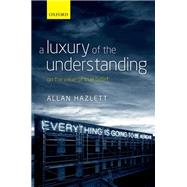The value of true belief has played a central role in history of philosophy--consider Socrates' slogan that the unexamined life is not worth living, and Aristotle's claim that everyone naturally wants knowledge--as well as in contemporary epistemology, where questions about the value of knowledge have recently taken center stage. It has usually been assumed that accurate representation--true belief--is valuable, either instrumentally or for its own sake. In A Luxury of the Understanding, Allan Hazlett offers a critical study of that assumption, and of the main ways in which it can be defended.
Hazlett defends the conclusion that true belief is at most sometimes valuable. In the first part of the book, he targets the view that true belief is normally better for us than false belief, and argues that false beliefs about ourselves--for example, unrealistic optimism about our futures and about other people, such as overly positive views of our friends--are often valuable vis-a-vis our wellbeing. In the second part, he targets the view that truth is "the aim of belief," and argues for anti-realism about the epistemic value of true belief. Together, these arguments comprise a challenge to the philosophical assumption of the value of true belief, and suggest an alternative picture, on which the fact that some people love truth is all there is to "the value of true belief."








